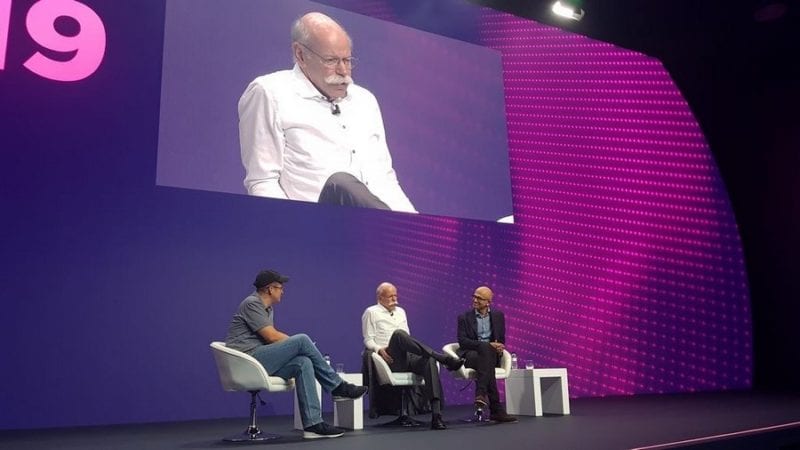Microsoft CEO: “Every Company is Now a Software Company”

Daimler CEO Dieter Zetsche and Microsoft CEO Satya Nadella talk about the transformation of their companies – and want to work together more in the future. Photo: Gerster
At Mobile World Congress (MWC), two of the world’s most prominent business leaders discussed what companies need to do to be successful in the future — and these insights could be of value to leaders in the satellite industry. Satya Nadella, Chief Executive Officer (CEO) at Microsoft and Dieter Zetsche, chairman of the board of management at Daimler AG and head of Mercedes-Benz Cars took to the stage to discuss how they view the future. Nadella said with the state of the world, every company is now a software company. “I think a lot about what happens in computing. It is getting embedded in our world. Computing is a core part of every industry. A car is now a computer. Software skills are a valuable resource. I don’t think in ten years we will have these demarcations. We won’t have the tech industry and other industries,” she said.
Nadella said that as computing becomes more ubiquitous, it presents a new set of challenges to companies. “You want to get world class technology, but then you need to get your own world class technology to build on top of it. The second part is about trust. You need to have trust in your supply chain. It applies to companies and countries. I am a big student of organizations that have had significant success. The core question is — what does it take? You need a core sense of identity and purpose. As software becomes part of every industry, it needs to mature, and be robust enough for different programs.”
Nadella took on a significant challenge when becoming the CEO of Microsoft. He gave some interesting insights into how the culture needed to change for the company to not be living on past glories. “We had Bill Gates,” he said. “That was both an advantage and disadvantage. One of the disadvantages was that we had 30 people who thought they were Bill Gates. We had a lot of hubris. We had to learn it all again. This is all about culture. Some of the technology shifts are easier to do. Some of the business model shifts are harder to do. The transformation of technology was not the hard part — the business model was the tough part. You have to think about the market differently. Market pressures will happen anyway.”
Like many other speakers, Nadella spoke about the potential of Artificial Intelligence (AI). He said that the breakthroughs in AI “will now become fast and furious” and that its potential is “phenomenal”.
A hot topic in the satellite industry in recent years has been the connected car. While we are yet to see what impact the industry could have on this market, it was interesting to hear Zetsche talk about the transformation happening at Daimler. He said that when Daimler talks about new systems, they have to be open source, because Daimler needs the skills of the whole community. “We are initiating it. We have totally different mindset and concept to what we had before. We need to use all the capabilities and build on top of it. We are in a transformation in our industry. Ten years from now, our industry will be totally different,” Zetsche said.
According to Zetsche, Daimler took its top management to visit a number of small start-ups in Silicon Valley. “It is not a given that we will be around tomorrow. It is important to expose your people to different setups. You have to find new benchmarks to measure yourself against. There is a widening scope to measure yourself against. We are getting more people involved. Some may worry that the automotive market is on the decline,” he said.
Zetsche spoke of working with competitors — such as BMW — to improve its technology offerings. He said that the culture is very much of ‘frenemies’ — fighting each other for customers, but working together to bring state-of-the-art technology to customers. He added, “We think the car will be the most complex part of the Internet of Things (IOT) environment,” he said, “It is clear that autonomous driving will become a reality. This is the next trend we want to be a part of. Many people will own cars, but there will be different ways of using cars. You will have electrification. These trends are all coming together. Science fiction is now becoming part of reality.”